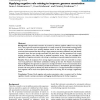41 search results - page 3 / 9 » Improving interoperability between microbial information and... |
ER
2006
Springer
13 years 9 months ago
2006
Springer
Ontologies on the Semantic Web are by nature decentralized. From the body of ontology mapping approaches, we can draw a conclusion that an effective approach to automate ontology m...
BMCBI
2007
13 years 5 months ago
2007
Background: Unsupervised annotation of proteins by software pipelines suffers from very high error rates. Spurious functional assignments are usually caused by unwarranted homolog...
CAISE
2005
Springer
13 years 11 months ago
2005
Springer
Abstract. Recently, the database and AI research communities have paid increased attention to ontologies. The main motivating reason is that ontologies promise solutions for comple...
BMCBI
2004
13 years 5 months ago
2004
Background: Single Nucleotide Polymorphisms (SNPs) are an increasingly important tool for genetic and biomedical research. Although current genomic databases contain information o...
EDBT
2008
ACM
13 years 7 months ago
2008
ACM
The goal of the Semantic Web is to support semantic interoperability between applications exchanging data on the web. The idea heavily relies on data being made available in machi...

